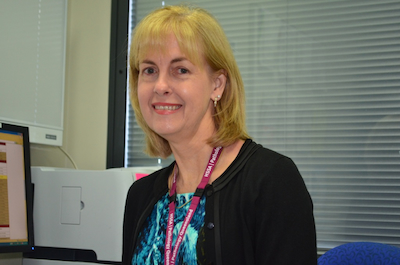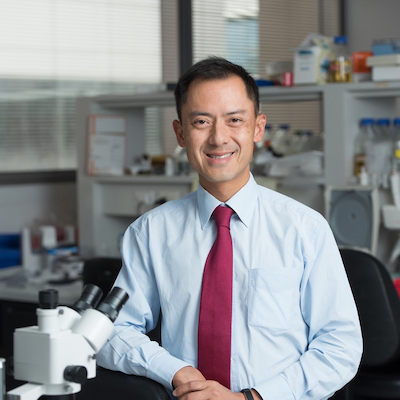International precision medicine clinical trials recruiting
Two new international clinical trials are expected to improve access to new therapies for Australians with MDS as part of the Leukaemia Foundation’s Trials Enabling Program (TEP).
This innovative program has helped many Australians access new clinical trials and novel therapies years ahead of their expected availability on the Australian market. In partnership with leading blood cancer clinical trial group, the Australasian Leukaemia & Lymphoma Group (ALLG), TEP is helping Australians with blood cancer access the latest research and treatments through international clinical trials, without leaving the country.

The Phase III trials – ALLG AMLM23 and ALLG AMLM24 – have been launched at hospital sites across the country and are the first studies in Australia in collaboration with the Haemato Oncology Foundation for Adults in the Netherlands (HOVON), and the German-Austrian Acute Myeloid Leukaemia Study Group, Germany (AMLSG).
Both trials are for newly diagnosed AML or MDS, with either the IDH1 or IDH2 mutation (AMLM23) or FLT3 mutation (AMLM24).
About AMLM23 and AMLM24
Over time, approximately one-third of MDS patients will go on to develop AML. The risk of developing AML depends on a patient’s MDS sub type but varies from a two in 10 chance for people with low-risk MDS to a four in 10 chance with high-risk MDS.
Although differences in cell biology exist between MDS and AML occurring secondary to MDS, these two diseases are genetically related. In almost every case of progression from MDS to AML, disease progression is associated with clonal evolution and mutations in particular genes.
The ALLG AMLM23 and ALLG AMLM24 clinical trials will enable MDS patients with excess blasts (MDS-EB2) and associated risk of developing AML, to access new targeted treatments for AML that may impact positively on the progression of their disease.
Around 20% of patients with newly diagnosed AML have genetic changes or mutations in two proteins – IDH1 or IDH2. The AMLM23 trial is targeting patients with IDH1- or IDH2-postive AML or MDS with excess blasts (MDS-EB2) who have not undergone previous chemotherapy.
AMLM23 is exploring the impact of adding precision therapies, ivosidenib and enasidenib, to standard treatment.
Ten patients have already been recruited to the trial at hospital sites in Townsville, Melbourne, Perth, and Sydney, with plans to open at 20 sites across Australia and recruiting 80 patients over four years.
Recruitment for the AMLM23 clinical trial is currently open at a further 125 sites across nine European countries and is targeted to reach 968 participants by 2023.
The Australian arm of this trial is led by Principal Investigator Professor Paula Marlton, Head of Leukaemia and Deputy Director of Haematology at the Princess Alexandra Hospital (Brisbane) and a member of the Blood Cancer Taskforce.

She described the AMLM23 trial as “an important example of how international collaborations can help improve access to new therapies for Australians with blood cancer”.
Around 30% of patients with newly-diagnosed AML experience changes in the FMS-like tyrosine kinase 3 gene (FLT3). Adding therapies like midostaurin, which target these gene changes, can improve survival in these patients.
The HO156/AMLM24 trial, led by HOVON, is investigating whether either midostaurin or a more potent FLT3-targeted therapy, gilteritinib, can improve survival for these patients when added to intensive chemotherapy.
The trial’s Australian arm has opened, with the first patient recruited at The Alfred Hospital (Melbourne), and a further 24 sites planned to open across Australia, recruiting up to 80 AML patients over three years. In addition, recruitment across 16 European countries began in late 2019, with a target of 798 patients.
Chief Investigator Associate Professor Andrew Wei from The Alfred Hospital is leading the AMLM24 trial in Australia.
“This is a globally significant and potentially practice-changing trial that we are delighted to be participating in nationally with the support of the ALLG and Leukaemia Foundation,” Dr Wei said.
“It will provide our patients with access to new and potentially beneficial drugs in the front line setting and after stem cell transplant.”
Both the AMLM23 and AMLM24 trials aim to understand whether the addition of new therapies to existing standard treatments will improve outcomes for respective targeted patients.
Last updated on January 3rd, 2023
Developed by the Leukaemia Foundation in consultation with people living with a blood cancer, Leukaemia Foundation support staff, haematology nursing staff and/or Australian clinical haematologists. This content is provided for information purposes only and we urge you to always seek advice from a registered health care professional for diagnosis, treatment and answers to your medical questions, including the suitability of a particular therapy, service, product or treatment in your circumstances. The Leukaemia Foundation shall not bear any liability for any person relying on the materials contained on this website.